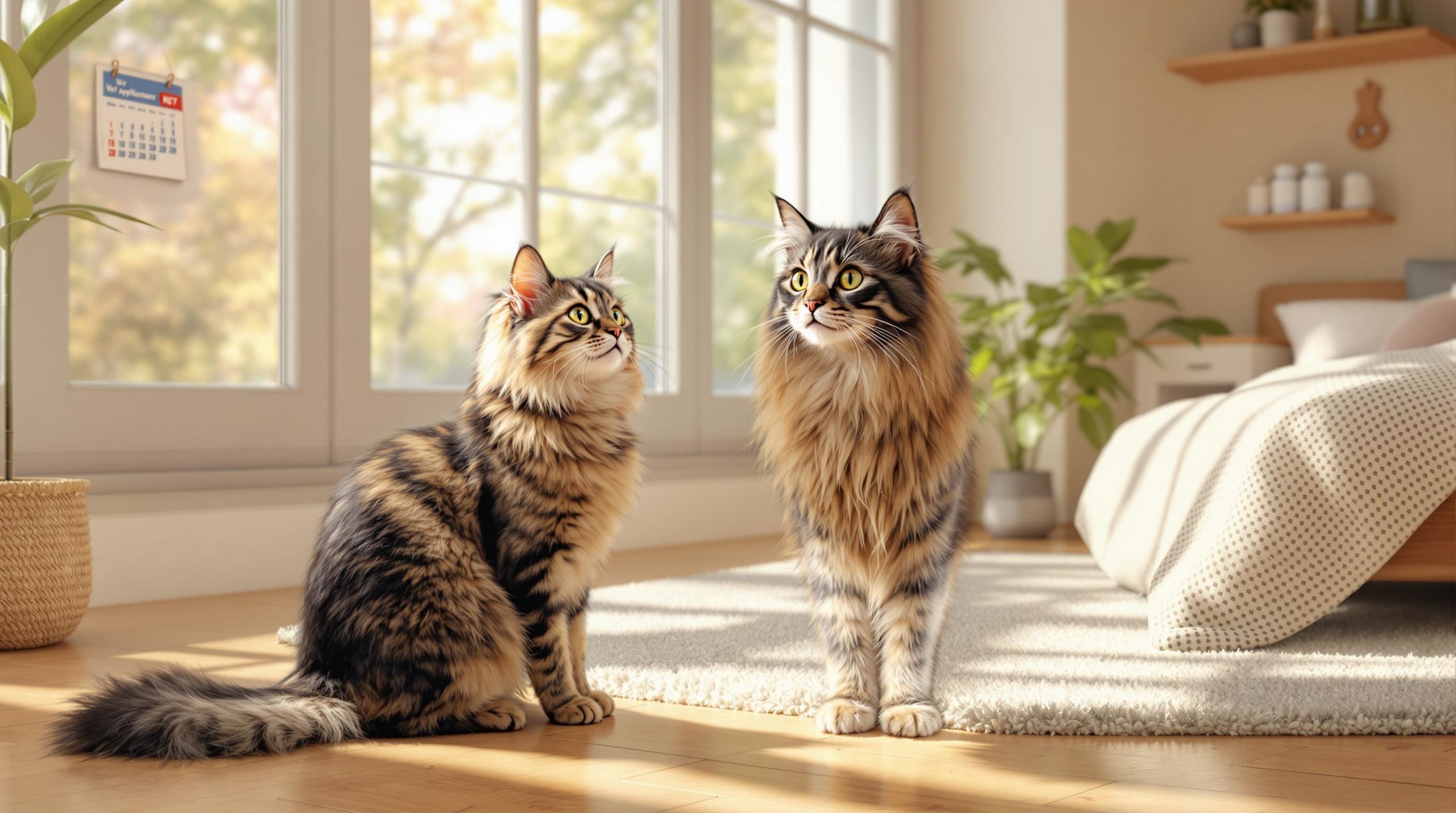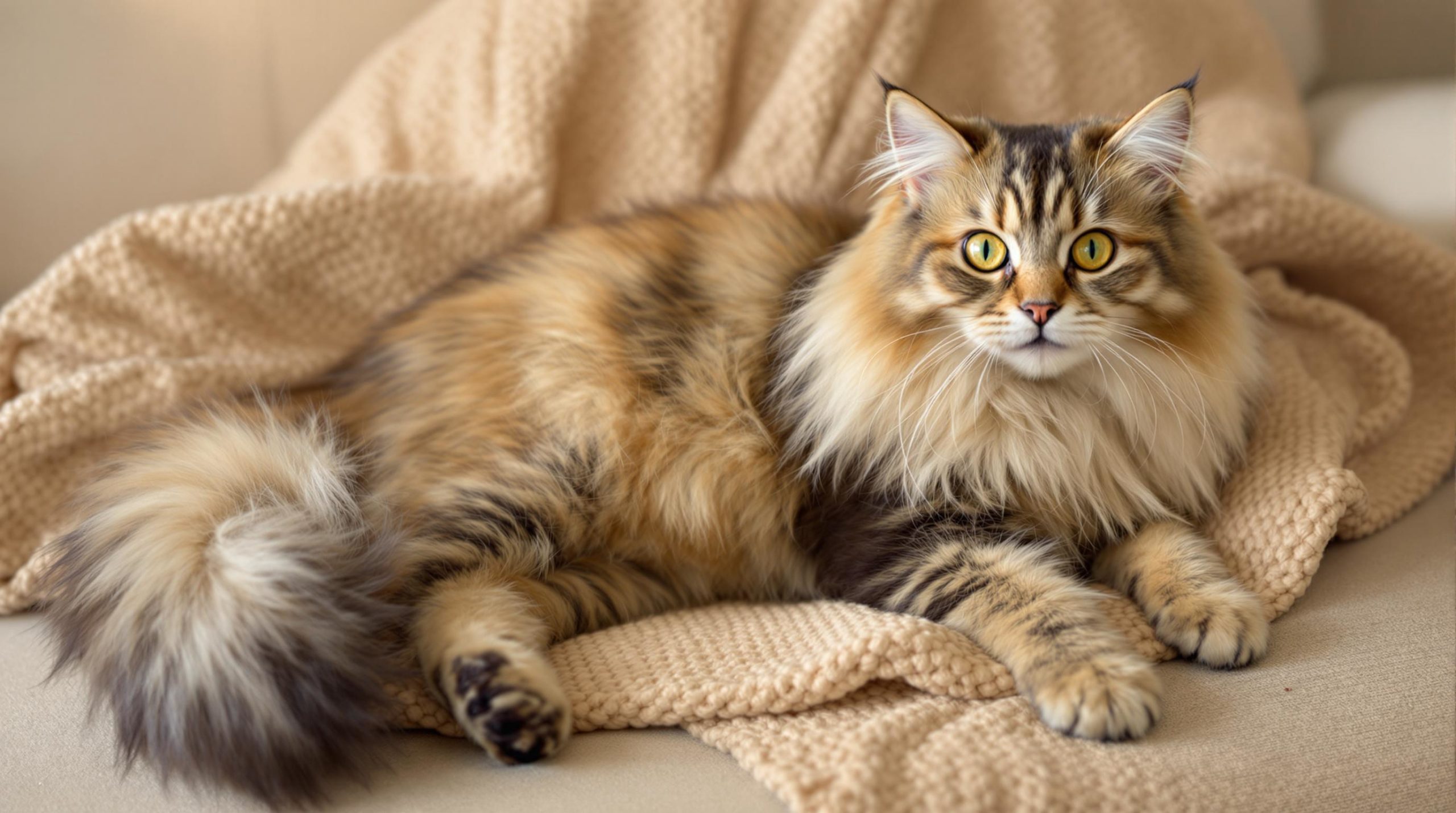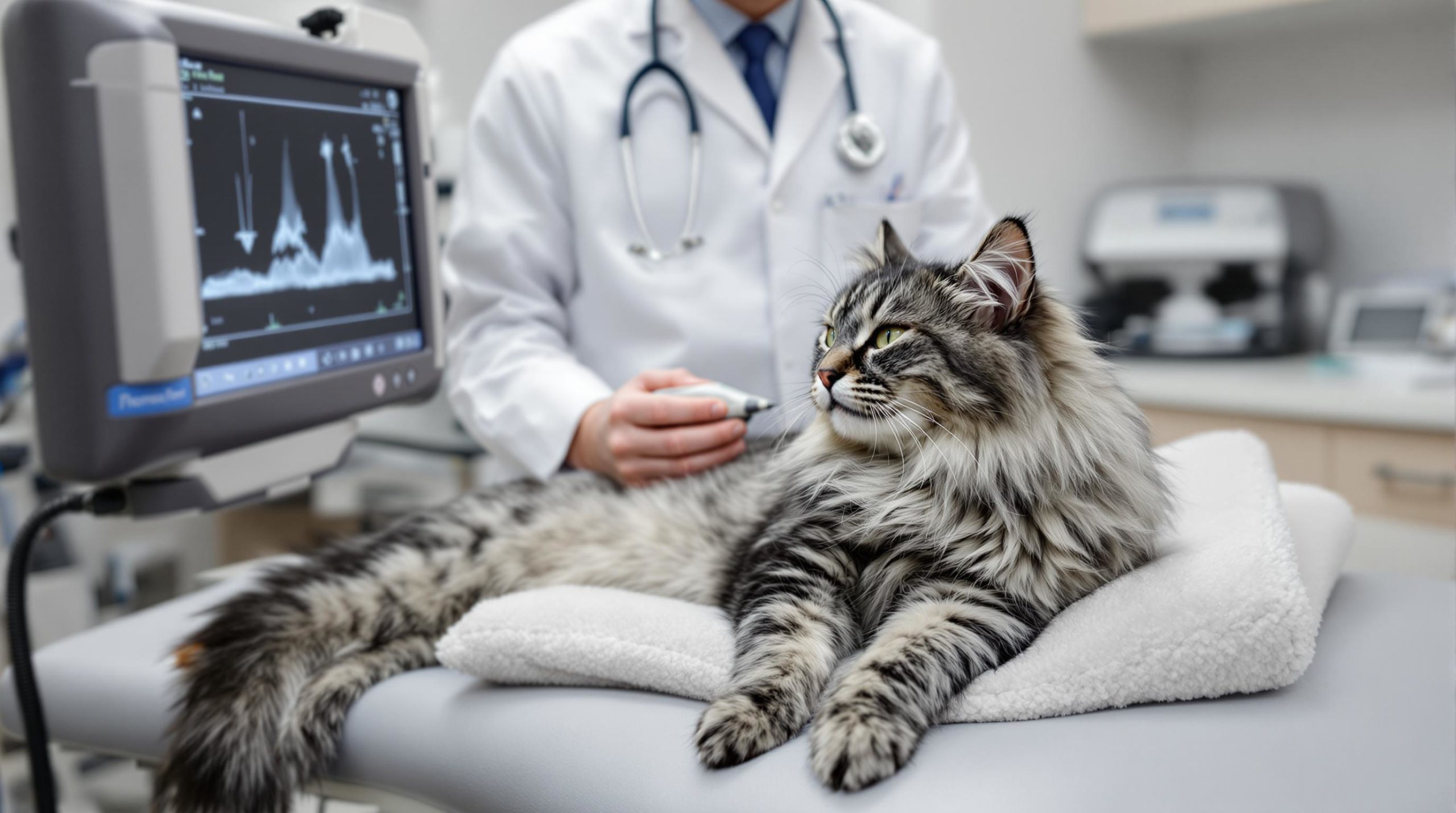understanding the potential health risks of Maine Coons

Did you know that while Maine Coons are often celebrated for their robust size and gentle demeanor, they carry a unique set of potential health risks? Understanding these vulnerabilities helps cat lovers provide the best possible care, ensuring these magnificent felines live long, vibrant lives.
Common Genetic and Breed-Specific Health Risks in Maine Coons
Maine Coons pride themselves on their hardy constitution, a trait that has made them popular among cat enthusiasts worldwide. However, their genetic lineage predisposes them to several diseases that, when caught early, can be managed or at least mitigated.
Owners often marvel at their Maine Coons’ striking looks and affectionate behavior, but this should not overshadow the reality of certain breed-associated health conditions. Hypertrophic Cardiomyopathy (HCM) is among the most prevalent and concerning issues—characterized by thickening of the heart muscle, it can stealthily progress and lead to sudden cardiac events.
Other hereditary conditions include Spinal Muscular Atrophy (SMA), a disease primarily appearing in young kittens that impairs voluntary movement, and Hip Dysplasia, which hinders mobility and causes joint pain especially in adulthood. Chronic Kidney Disease (CKD) is also a critical concern, often manifesting in senior cats.
Early detection is key. Regular veterinary screenings incorporating echocardiograms for heart evaluation, genetic tests, and mobility assessments can pave the way for timely interventions.
| Condition | Typical Onset Age | Key Symptoms |
|---|---|---|
| Hypertrophic Cardiomyopathy (HCM) | Young Adult (2–4 years) | Sudden collapse, rapid breathing, coughing, hind-leg paralysis |
| Spinal Muscular Atrophy (SMA) | 3–4 Months | Wobbling, tremors, difficulty jumping |
| Hip Dysplasia | Adult to Senior | Stiffness, reluctance to jump, sore joints |
| Chronic Kidney Disease (CKD) | Senior (7+ years) | Increased thirst, weight loss, dull coat |
| Dental Problems | As early as 6 months | Bad breath, bleeding gums, loss of appetite |
| Obesity | Adult | Difficulty moving, overeating, diabetes risk |
- Maine Coon Genetics influences prevalence of hereditary diseases.
- Routine health screening is essential for preventive care.
- Veterinary Insights guide early diagnosis and treatment.
Further details about these conditions and how the latest veterinary technologies help in management can be found at Maine Coon Health Problems.

Hypertrophic Cardiomyopathy (HCM): The Silent Threat to Maine Coon Heart Health
Hypertrophic Cardiomyopathy is often an unseen danger, affecting up to 30% of Maine Coons based on some studies. This disease thickens the heart’s walls, diminishing its ability to pump blood effectively. Even cats appearing healthy may harbor HCM, highlighting the need for vigilance.
Observable signs might include rapid or labored breathing, fainting episodes, or sudden paralysis in the hind legs due to blood clots. Detecting HCM early can dramatically improve outcomes—echocardiograms remain the gold standard for diagnosis.
Caring owners can support heart health through tailored diets low in sodium and rich in antioxidants, alongside veterinary-prescribed medications when necessary. Cats with diagnosed HCM benefit from routine monitoring and adjustments to their lifestyle to minimize stress.
- Schedule annual heart ultrasounds starting at age 2.
- Provide a heart-friendly diet with veterinary guidance.
- Monitor for subtle symptoms, especially breathing and mobility changes.
Maine Coon enthusiasts can dive deeper into managing this condition through resources like Maine Coons Blue Eyes which also touches on the genetics intricacies related to this breed.
How Early Screening Makes a Difference
Because HCM can remain asymptomatic for years, breeders and owners rely on genetic screening tests to identify at-risk kittens before symptoms arise. This approach helps guide responsible breeding decisions and timely veterinary care.
Veterinary clinics now offer combined screenings that examine heart function, kidney health, and potential hereditary markers—helping to spot concerns before they affect quality of life.
| Screening Method | Purpose | Ideal Timing |
|---|---|---|
| Echocardiogram | Assess heart muscle thickness and function | From 2 years old, annually |
| Genetic Test for HCM | Identify genetic predisposition | Kitten stage or before breeding |
| Physical Exam & Bloodwork | General health and organ function | Annually |

Spinal Muscular Atrophy and Mobility Challenges: Supporting Maine Coons Through Life’s Hurdles
Spinal Muscular Atrophy, affecting mostly young Maine Coon kittens, manifests with weakness and tremors caused by deterioration of neurons controlling voluntary movement. This genetic ailment does not lessen lifespan nor affect cognitive function but requires thoughtful care adaptations.
Owners often notice wobbling motion or difficulties jumping during early kittenhood, signaling a need for veterinary evaluation.
The absence of a cure means supporting comfort and mobility through environmental changes such as:
- Lowering feeding dishes and litter boxes for easier access
- Adding ramps or steps to favorite resting areas
- Ensuring non-slip surfaces to reduce fall risks
Maine Coon owners can supplement traditional care with guidance from indoor-outdoor Maine Coon care techniques that promote safe exercise tailored to individual capabilities.
| Symptom | Impact | Care Adaptation |
|---|---|---|
| Wobbling and tremors | Reduces jumping ability | Provide ramps and easy-access areas |
| Reduced muscle strength | Challenges with mobility | Frequent gentle exercise, cushioned resting spots |
| Stable cognition | Normal mental activity | Engaging toys and interaction |
The Role of Breeding Practices in Reducing SMA
Because SMA is genetically inherited, responsible breeders perform genetic screening before mating to avoid passing on faulty genes. Prospective owners should inquire about these screenings to ensure they adopt healthy kittens.
Learning from specialists in Cat Breed Specialization is invaluable when considering the long-term wellbeing of Maine Coons, especially those with known genetic conditions.
Chronic Kidney Disease and Other Age-Related Concerns in Maine Coons
Chronic Kidney Disease (CKD) is a common and increasingly recognized problem in aging Maine Coons. Unlike some inherited conditions, CKD typically emerges later in life but requires consistent attention to preserve quality of life.
This disease damages renal tissue gradually, leading to symptoms such as:
- Increased thirst and urination
- Weight loss and muscle wasting
- Lethargy and poor appetite
While CKD cannot be cured, early detection through veterinary blood and urine tests allows owners to initiate proper dietary modifications and hydration strategies that can slow progression considerably.
Adding supplements like omega-3 fatty acids and feeding kidney-supportive diets are part of Pet Nutrition Solutions advocated by Feline Health Advisors to maintain wellbeing.
| CKD Symptom | Management Strategy | Expected Outcome |
|---|---|---|
| Increased thirst & urination | Regular monitoring and hydration support | Delay severe kidney damage |
| Weight loss | Appetite stimulants and nutrient-rich diets | Maintain muscle mass |
| Lethargy | Adjustments to activity level | Reduce stress on kidneys |
Owners interested in the specifics of feline kidney health and diet adjustments can explore detailed guides at Caring for Fat Maine Coon, offering tips on both obesity and kidney care challenges.
Weight Management, Dental Health, and Other Essential Cat Care Elements
Obesity in Maine Coons is a growing concern as indoor lifestyle choices and overfeeding become commonplace. Excess weight compounds risks for arthritis, diabetes, and fatty liver disease.
Maintaining a healthy weight involves:
- Portion-controlled feeding tailored to life stage
- Providing stimulating play to encourage exercise
- Regular weight monitoring and body condition scoring
Dental health is another cornerstone of feline wellness. Routine dental checks and brushing not only alleviate pain caused by periodontal diseases but also prevent infections affecting kidney and heart health.
Recognizing signs such as bad breath, bleeding gums, or reluctance to eat can prompt early veterinary intervention.
| Health Concern | Preventive Measure | Benefit |
|---|---|---|
| Obesity | Controlled diet, regular exercise | Reduced risk of diabetes and arthritis |
| Dental Disease | Daily brushing, vet cleanings | Improved oral and overall health |
| Regular Vet Check-ups | Annual wellness exams | Early detection of emerging health problems |
For practical advice and visual tips on managing these challenges in Maine Coons, explore comparisons of domestic longhair cats and Maine Coons that emphasize breed-specific needs.
Best Practices for Maine Coon Health and Responsible Ownership
Owning a Maine Coon entails devotion to their physical and emotional wellbeing. With informed choices, these gentle giants can thrive well into their senior years.
Key guidelines for owners and breeders alike include:
- Health Screening: Ensuring health testing for genetic ailments such as HCM, SMA, and hip dysplasia before adoption or breeding.
- Regular Veterinary Care: Annual visits with comprehensive panels and imaging to catch subtle changes early.
- Nutrition and Weight Control: Feeding balanced, species-appropriate diets and avoiding overfeeding.
- Environmental Enrichment: Providing stimulating toys, climbing structures, and safe outdoor access if possible. Find tips on managing outdoor exposure responsibly at Indoor Outdoor Maine Coon.
- Dental Maintenance: Committing to daily brushing routines and professional cleanings reduces long-term dental disease risks.
Breeders who incorporate these standards contribute immensely to healthy Maine Coon populations, while informed owners create loving environments that allow these cats to reach their full potential. Learn about breeding maturity and timing with resources like Breeding Age Maine Coon.
Summary Table: Key Maine Coon Health Risks and Preventive Actions
| Health Issue | Preventive Action | Owner Tips |
|---|---|---|
| Hypertrophic Cardiomyopathy (HCM) | Genetic screening, echocardiograms | Annual heart exams, heart-friendly diet |
| Spinal Muscular Atrophy (SMA) | Genetic testing before breeding | Environmental adaptations, safe exercise |
| Hip Dysplasia | Weight control, joint support diet | Mobility aids, veterinary pain management |
| Chronic Kidney Disease (CKD) | Blood and urine tests, kidney care diets | Hydration, monitor symptoms carefully |
| Dental Issues | Regular brushing and cleanings | Watch for bad breath and eating issues |
| Obesity | Portion control, exercise | Frequent weight checks, stimulate activity |
Frequently Asked Questions about Maine Coon Health Risks
- Q: How often should I have my Maine Coon screened for heart disease?
A: Ideally, start echocardiograms around age two, then yearly if risk factors or symptoms appear. - Q: Can SMA affect my Maine Coon’s lifespan?
A: No, SMA mainly affects mobility but does not impact longevity or cognition. - Q: How can I prevent obesity in my Maine Coon?
A: Balanced feeding practices and daily playtime are critical to maintain ideal weight. - Q: What signs suggest dental disease in Maine Coons?
A: Bad breath, gum bleeding, and reluctance to eat warrant a veterinary dental exam. - Q: Are indoor Maine Coons less prone to health problems?
A: Indoor living reduces risks from trauma and infections but owners must ensure enrichment and monitor weight carefully. For more on indoor versus outdoor life, visit Indoor Outdoor Maine Coon.